Prayer Articles and Books
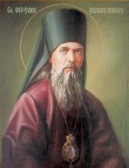 Saint Theophan The Recluse -
Saint Theophan The Recluse -
Be sure to read this Page!
St. Theophan the Recluse, also known as "Theophan Zatvornik" (Russian: Феофан Затворник), (1815–1894) is a well-known saint in the Russian Orthodox Church.
Enter here to read his classic four homilies on prayer. Written for lay people in clear language, but with the highest aim in prayer. This is undoubtedly one of the best treatise on prayer. In four short sermons he takes you from the very beginning showing you the path to the highest form of prayer...read more
From the Desert Fathers
Abba Evagrius on Prayer - Abba Evagrius the Monk
How Do We Pray? - anonymous fathers of the desert
On Prayer - St. Gregory of Sinai
Prayer and Meditation - anonymous father of the Egyptian desert
Teachings on Prayer - anonymous fathers of the desert
Why God answers Some Prayers and Not Others - Abba Ammonas
 St. Macarius the Great (AD 300-390)
St. Macarius the Great (AD 300-390)
Homily 19
Homily 33
Unceasing Prayer
It is necessary at first for one coming to the Lord force himself thus to do good and, even if he should not in his heart be so inclined, he must constantly await his mercy with unshakened faith and push himself to love, even if he does not have love. He ought to push himself to meekness, even if he has none, to mercy and to have a merciful heart... Let him push himself to prayer even when he does not possess the prayer of the Spirit. And so. God, seeing him striving so and pushing himself by determination, even if the heart is unwilling... fills him with the fruits of the Spirit.
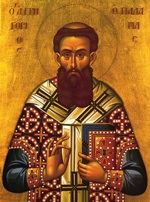 St. Gregory Palamas
St. Gregory Palamas
Pray Unceasingly -
Saint Gregory Palamas (Γρηγόριος Παλαμάς) (1296 - 1359) was a monk of Mount Athos in Greece and later the Archbishop of Thessalonica known as a preeminent theologian of Hesychasm.
"Let no one think, my brother-Christians, that it is the duty only of priests and monks to pray without ceasing, and not of laymen. No, no; it is the duty of all of us Christians to remain always in prayer...."
 St. Ignaty (Brianchaninov)
St. Ignaty (Brianchaninov)
From the Arena on Prayer
On Preparation For Prayer
On Attention at Prayer
Practicing the Jesus Prayer
Saint Ignatius Brianchaninov (1807-1867) is a saint in the Russian Orthodox Church.  At the age of 26 was appointed superior of the St. Sergius monastery in St. Petersburg. In 1857, he was consecrated Bishop of the Caucasus and the Black Sea, but he retired only four years later to devote himself to spiritual writing.
At the age of 26 was appointed superior of the St. Sergius monastery in St. Petersburg. In 1857, he was consecrated Bishop of the Caucasus and the Black Sea, but he retired only four years later to devote himself to spiritual writing.
He wrote a large amount of material, mostly about the spiritual life and prayer. Only a small portion of his writing has been translated into English.
"It is impossible for a person to turn with all his thought, with all his strength and with all his being towards God, except by the action of prayer..."
 Archimandrite Sophrony
Archimandrite Sophrony
On
Prayer - Dangers
Prayer of the Spirit
The Struggle in Prayer
Jesus Prayer: The Method
Archimandrite Sophrony (Sakharov) (23 September 1896 – 12 July 1993), also Elder Sophrony, was best known as the disciple and biographer of St Silouan the Athonite and compiler of St Silouan's works, and as the founder of the Patriarchal Stavropegic Monastery of St. John the Baptist in Tolleshunt Knights, Maldon, Essex, England.
"Misfortune in the shape of reduced circumstances, illness or the death of a loved one often drives people to prayer. But if the situation alters for the better, not only does their impulse to pray abate- prayer itself may seem
pointless. But there is a different kind of prayer, prayer of the spirit, fastened on eternity, and here no external well-being can heal the sufferings of the soul who sees herself falling short of the sought-for eternal. ...
 Bishop Hilarion (Alfeyev)
Bishop Hilarion (Alfeyev)
Prayer and Silence
Hilarion (Alfeyev), Bishop of Vienna and Austria, is a hierarch of the Moscow Patriarchate, theologian, church historian, composer.
"To achieve silence: this is of all things the hardest and the most decisive in the art of prayer. Silence is not merely negative - a pause between words, a temporary cessation of speech - but, properly understood, it is highly positive: and attitude of attentive alertness, of vigilance, and above all of listening....
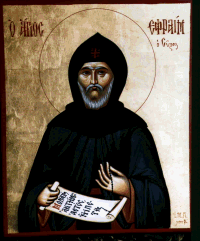 Saint Ephrem the Syrian
Saint Ephrem the Syrian
On Prayer
"Whether you are in church, or in your house, or in the country; whether you are guarding sheep, or constructing buildings, or present at drinking parties, do not stop praying....
 Monk Moses
Monk Moses
Prayer
as an Important Aspect of our Spiritual Life -
Monk Moses was born in Athens, Greece and has been living the monastic life on Mount Athos since 1975. He is the Elder of the Kalyvi of St. John Chrysostom at the Skete of St. Panteleimon of the Koutloumoussiou Monastery. He has already published 15 books and over 300 articles in newspapers and journals in Greece and abroad.
"The life of prayer, which we shall discuss, is one part of a much broader topic spiritual life in general the life in Christ, spiritual ascension, the way to sanctification and deification. Combined with personal inner purification and a regular sacramental life, a life of prayer will help significantly in the regeneration of the faithful during this difficult period in which we live...."
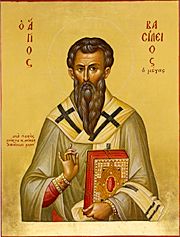 Saint Basil the Great
Saint Basil the Great
Be Attentive
What Scripture Teaches About Prayer
Work versus Prayer
On Prayer - Excerpts from his writings
We must strive after a quiet mind. As well might the eye ascertain an object put before it while it is wandering restless up and down and sideways, without fixing a steady gaze upon it, as a mind, distracted by a thousand worldly cares, be able clearly to apprehend the truth....
 Tertullian (ca.160 – ca.220 AD)
Tertullian (ca.160 – ca.220 AD)
On Prayer
Includes commentary on Lord's Prayer as well as many practical instructions about how to pray.
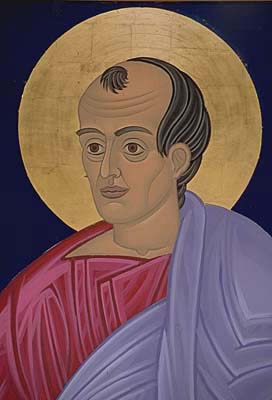 Origen
Origen
On Prayer
The Person who is about to come to prayer should withdraw for a little and prepare himself, and so become more attentive and active for the whole of his prayer. He should cast away all temptation and troubling thoughts and remind himself so far as he is able of the Majesty whom he approaches, and that it is impious to approach Him carelessly, sluggishly, and disdainfully; and he should put away all extraneous things.
 Saint Gregory of Nyssa
Saint Gregory of Nyssa
The Lord's Prayer - Five Homilies
Trans. by Theodore G. Stylianopoulos, 2003
Gregory of Nyssa (c 335 – after 394) was a Christian bishop and saint. He was a younger brother of Basil the Great and a good friend of Gregory Nazianzus. His significance has long been recognized in the Eastern Orthodox, Oriental Orthodox, and Roman Catholic branches of Christianity. Gregory along with his brother Basil of Caesarea and Gregory of Nazianzus are known as the Cappadocian Fathers.
Life of Saint Gregory
Introduction by T. G. Stylianopoulos
Homily 1 - Why we pray
"The present gathering needs to learn not only how to pray but that we must, by all means, pray. Perhaps, this has not yet been understood by many. For many in daily life have neglected and passed over this sacred and divine work of prayer. ..."
Homily 2 - Our Father Who Are In Heaven
"Do you see how much preparation we need? What quality of life? How much and what kind of diligence in order that our conscience rise to that level of confidence to dare address God as "Father?..."
Homily 3 - Hallowed Be Thy Name, Thy Kingdom Come
"Therefore, when I pray saving "Hallowed be Thy Name," the meaning of these words apply to me actualizing God's blessings. Lord, through the cooperation of Your help, may I become blameless, just and pious...."
Homily 4 Thy Will Be Done... Give Us This Day Our Daily Bread
"When therefore we stand to say to God "Thy Will be done also in me," it is entirely necessary first to condemn that manner of conduct which is lived outside the divine will and to fully own up to it in confession....
Homily 5 Forgive Us Our Debts As We Forgive Our Debtors...
"Do you see to what greatness the Lord exalts those who hear Him through the words of the prayer? He transforms human nature in some way to be closer to the divine..."
 Saint John Chrysostom
Saint John Chrysostom
On the Lord's Prayer
Homily 19 on St. Matthew- Chapter 6.
Trans. by Rev. Sir George Prevost, Bt., 1851
Rev. Am. ed. by Rev. Matthew B. Riddle, 1888
Saint John Chrysostom (c. 347–407, Greek: Ιωάννης ο Χρυσόστομος), archbishop of Constantinople, was an important Early Church Father. He is known for his eloquence in preaching and public speaking, his denunciation of abuse of authority by both ecclesiastical and political leaders, the Divine Liturgy of St. John Chrysostom, and his ascetic sensibilities.
"...neither should we make our prayers long; long, I mean, not in time, but in the number and length of the things mentioned. For perseverance indeed in the same requests is our duty...
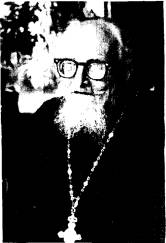 Protopresbyter Michael Pomazansky (1888 - 1988)
Protopresbyter Michael Pomazansky (1888 - 1988)
Prayer as the Expression of the Inward Life of the Church
PRAYER is the manifestation of the Church's life and the spiritual bond of its members with God in the Holy Trinity, and of all with each other. It is so inseparable from faith that it may be called the atmosphere of the Church or the breathing of the Church. Prayers are the threads of the living fabric of the Church body, and they go in all directions. The bond of prayer penetrates the whole body of the Church, leading each part of it into the common life of the body, animating each part and helping it by nourishing, by cleansing, and by other forms of mutual help (Eph. 4:16). It unites each member of the Church with the Heavenly Father, the members of the earthly Church with each other, and the earthly members with the heavenly members. It does not cease, but yet more increases and is exalted in the Heavenly Kingdom.
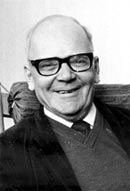 Tito Colliander
Tito Colliander
On Prayer - Excerpts from The Way of an Ascetic
A simle and clear presentation on need for ceaseless prayer
"Prayer does not stop when morning devotions are over. Now it is a matter of maintaining prayer the whole day through, no matter what the day’s complications."
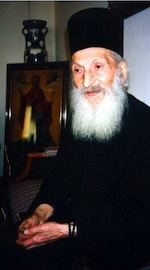 His Holiness Patriarch Pavle –
His Holiness Patriarch Pavle –
On Prayer
Prayer as the Essential Need of Man
"Prayer is the pious direction of man’s soul to God, or the communication of the heart with God, through which God is represented before man as man pours the feelings of his soul before Him...."
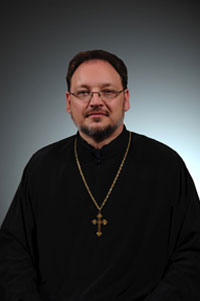 Fr. Andrew Jarmus
Fr. Andrew Jarmus
Prayer: "...the test, the source, the driving force... of all things"
By Fr. Andrew Jarmus
"Prayer is the test of everything; prayer is also the source of everything; prayer is the driving force of everything; prayer is also the director of everything. If prayer is right, everything is right. For prayer will not allow anything to go wrong." — St. Theophan the Recluse
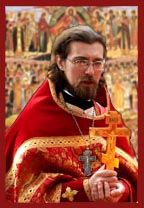 Father Sergei Sveshnikov
Father Sergei Sveshnikov
Mental Imagery in Eastern Orthodox Private Devotion
The overall attitude of the Orthodox Tradition forbids the use of mental imagery in prayer. Even though the adepts on the higher rungs of the spiritual ladder are reported to have visions[7] and revelations, the general advice to those who have not achieved perfection is to reject or at least ignore all and any visions and apparitions as potentially dangerous. The basis and the founding principle of Orthodox prayer is seen in repentance and humility, rather than in ecstasy and “favors.”
Saint Gregory Palamas Monastery - a great collection of articles on Prayer
Children
and Prayer
Children and Prayer -
An excellent article by a Bishop and Abbot on beginning to pray. Applicable to adults a well. As Orthodox parents, our most basic task is to bring our children to a sense of the truth, of the real-ness, of God. This is not the same thing as head-knowledge about God; it is a personal experience, through prayer, of the reality of God in our lives....
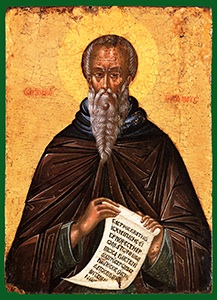 John Climacus
John Climacus
On Prayer - Step 28
Make the effort to raise up, or rather, to enclose your mind within the words of your prayer; and if, like a child, it gets tired and falters, raise it up again. The mind, after all, is naturally unstable, but the God Who can do everything can also give it firm endurance. Persevere in this, therefore, and do not grow weary; and He Who sets a boundary to the sea of the mind will come to you too during your prayer and will say, Thus far you shall come, and no farther" (Job 38:11). Spirit cannot be bound, but where He is found everything yields to the Creator of spirit.
 St John Cassian (ca. 360 – 435)
St John Cassian (ca. 360 – 435)
Four Kinds of Prayer - St. John Cassian
The Lord's Prayer - St. John Cassian
"Yet, as we advance in life and grow perfect in virtue, we should by preference pursue the kinds of prayer that are poured out as a result of contemplating future goods or from an ardent charity, or at least -- to speak in lowly fashion and in conformity with a beginner's standard -- that are produced for the sake of acquiring some virtue or destroying some vice. For we shall be utterly unable to attain to the more sublime types of prayer about which we have spoken if our mind has not been slowly and gradually brought forward through the series of those intercessions."
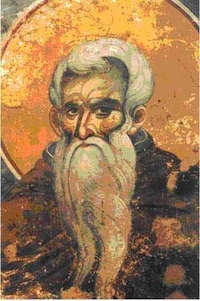 Saint Nilus the ascetic -
Saint Nilus the ascetic -
153 Texts on Prayer
The work consists of 153 small but comprehensive "chapters" that securely guide along the road to spiritual prayer whoever desires to read them, not hastily, but to study them carefully and assimilate them.
" Prayer is the ascent of the mind towards God. It is a spiritual labour that befits the human mind more than any other preoccupation."
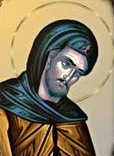 St. Symeon the New Theologian
St. Symeon the New Theologian
On Prayer and Attention -
Symeon the New Theologian (949–1022) is the latest of three saints of the Eastern Orthodox church to have been given the title of Theologian. St. Symeon was a poet who embodied the mystical hesychastic tradition. He wrote that humans could and should experience God directly.
"There are three methods of prayer and attentiveness, by means of which the soul is either uplifted or cast down. Whoever employs these methods at the right time is uplifted, but whoever employs them foolishly and at the wrong time is cast down...."
 St. Nicodemus of the Holy
Mountain
St. Nicodemus of the Holy
Mountain
Gaining the Habit of Prayer -
Nicodemus the Hagiorite or Nicodemus of the Holy Mountain , Athos (1749 - July 14, 1809) is a saint of the Greek Orthodox Church. He was an ascetic monk, mystic, theologian, and philosopher. His life's work was a revival of traditional Christian practices and patristic literature. He wrote ascetic prayer literature and influenced the rediscovery of Hesychasm
"If you desire to seek success in the work of prayer, adapt all else to this, lest you destroy with one hand what the other builds...."
 Elder Joseph of Vatopidi
Elder Joseph of Vatopidi
Prayer
of the Heart for the Faithful Living in the World
Spiritual Child of Elder Joseph the Hesychast
"Generally speaking, prayer is the sole obligatory and indispensable occupation and virtue for all rational beings, both sentient and thinking, human and angelic. For this reason we are enjoined to the unceasing practice of the prayer...."
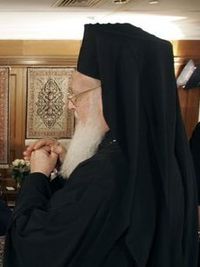 Ecumenical Patriarch Bartholomew
Ecumenical Patriarch Bartholomew
Way of Prayer -
Ecumenical Patriarch Bartholomew is the symbol of unity for the self-governing national and ethnic Orthodox Churches throughout the world. This article is an excerpt from his book, Encountering the Mystery.
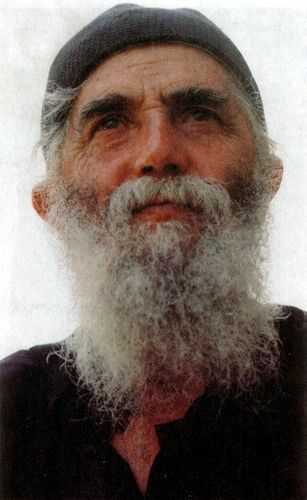 Elder Paisios
Elder Paisios
On Prayer -
Guidance on the Jesus Prayer
Paisios (Eznepidis), the Elder Paisios of Mount Athos, (Greek: Γέροντος Παϊσίου του Αγιορείτου) is a much revered monastic of Mount Athos. A devout ascetic, his gentle manner and acceptance of those who came to receive his advice, counsel, and blessing endeared him to his visitors. His popular words of counsel continue to be published.
“We should constantly and unceasingly repeat the Jesus prayer. Only the name of Christ must remain inside our heart and mind; when we neglect our prayer, that is our communication with God, the devil finds the chance to confuse us with negative thoughts. Thus, we end up not knowing what we want, do, or say....”
 Archbishop Stylianos of Australia
Archbishop Stylianos of Australia
On Prayer
His Eminence Archbishop Stylianos (Harkianakis) of Australia is the current archbishop of the Greek Orthodox Archdiocese of Australia.
"It has been correctly said that the greatest privilege, but also the greatest problem for the faithful, is prayer...
It appears that the more the person of God struggles to pray correctly and in a way that is pleasing to God, the more fully and deeply he or she comes to know the difficulties involved in such a feat.... The question arises: What is it that we are entitled to ask for in prayer? The Fathers who have dealt with this question agree that there is only one request of the faithful person in prayer: "the pardon of sins"....
While common worship in Church -in the context of which the Sacraments of the Church are always celebrated- ensures the sanctifying and salvific grace of the "communion of the Holy Spirit", private prayer cannot yield such transcendent results. This may secure inner stillness and greater compunction, including many other spiritual gifts, but it cannot replace in the least the grace of the Sacraments which presuppose a special celebrant with "apostolic succession" and "canonical priesthood".... "
A Monk at Saint Tikhon Monastery
Communing with God in Prayer
This is an introductory article on Prayer we clear guidelines.
"The goal of the Christian's life on earth is salvation in our Lord Jesus Christ and, at the same time, communion with God. The means for this communion is prayer, and through his prayer the Christian is joined in one spirit with the Lord (I Cory. 6:17). Prayer is the focal point and foundation of spiritual life and the source of salvation. Without prayer, as St. John Chrysostom says, there is no life in the spirit...."
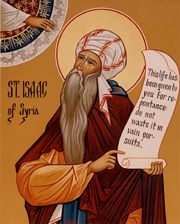 Isaac The Syrian
Isaac The Syrian
On Prayer
Stillness
Every good care of the intellect directed toward God and every meditation upon spiritual things is delimited by prayer, is called by the name of prayer and under its name is comprehended; whether you speak of various readings, or the cries of a mouth glorifying God, or sorrowing reflection on the Lord, or making bows with the body, or the alleluias of psalmody, or all the other things from which the teaching of genuine prayer ensues.
 By Metropolitan Anthony Bloom
By Metropolitan Anthony Bloom
"Prayer is the search for God, encounter with God, and going beyond this encounter in communion. ...our first steps in prayer take the form of astonishing reverent fear and a sense of sadness...."
Metropolitan Anthony (Bloom) of Sourozh (19 June 1914 - 4 August 2003), Metropolitan of the Russian Orthodox Church.
Articles:
On Intercessory Prayer
On Life and Prayer
On Prayer for The Departed
Courage to Pray - Excerpts
His books on prayer and the spiritual life are widely published:
1966 – Living prayer
Explores the relationship between worship and prayer and then goes to look at well-known prayers such as the Lord’s Prayer. Help and encouragement in learning to pray.
1970 – Beginning to pray
About the concepts of time, honesty, when God is seemingly absent, and much more. This is a very direct answer to many of our modern dilemmas.
1971 – God and Man
Summarizing the Christian life in terms of worship, joy, and the challenge to grow into a full stature, Metropolitan Anthony calls for a worshipful attitude to life.
1972 – Meditations on a theme: a spiritual journey
This book takes us on a path traced by centuries of Christian pilgrims, taking as landmarks for our meditations certain passages of the Gospel. At the close of this meditative journey , we are able to forget ourselves and enter into a vision that transcends us and at the same time leads us to contemplate trust, which alone can bring us to God.
1973 – Courage to Pray
The discovery of prayer, man's relationship with God is what gives us hope and courage to pray. The subject of prayer is explored as an essential element of self-awareness.
1986 – The Essence of Prayer
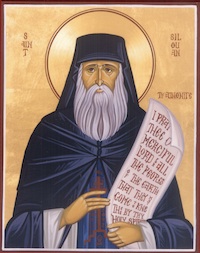 Saint Silouan -
Saint Silouan -
On Prayer
Pure Prayer
The Staretz considered prayer to be pure when it was accompanied by a softening of the heart so that both heart and mind in harmony lived the words of the prayer, which in this state nothing can cut short - the attention cannot be distracted, no irrelevant thought can intrude. As we have seen, this kind of prayer is a normal religious condition, very productive for the soul. To one extent or another it is known to many believers but only in rare instances does it evolve into perfect prayer.
Hieromonk Peter Seregin
Thoughts on Prayer
Prayer is extinguished by judging, which is the fruit of haughtiness and the threshold of anger. I blinds the heart and prevents prayer. Self-satidfaction and self-praise likewise extinguish prayer...
Orthodox Way of Life Blog - Entries on Prayer
Link here
Books on Prayer
Father
Arseny: Priest, Prisoner, Spiritual Father
by Vera Bouteneff, tr.
A powerful book that we recommend for
teens; illustrates the power of prayer.
Fr. Hopko writes, "In the demonic desolation of a Soviet labor camp, the imprisoned priest conquers nature, casts out demons, remits sin, reconciles sinners, heals the sick, feeds the hungry, protects the poor, comforts the afflicted, and proclaims release to the captives and liberty to the oppressed and loves every human being with the love of God Himself."
The
Way of a Pilgrim,
anonymous author (many translations available)
This is a great classic of Orthodox spirituality, specifically on the origin and practice of the Jesus Prayer. This book will help transform your life as it establishes you on the path of unceasing prayer.
Prayer
Changes Teens
A
book by Janet McHenry
Parenting teenagers isn’t easy. No matter how much we love our kids and want to protect them, we cannot control them or their circumstances. But God is in control, and– particularly when we trust him–he can take care of our kids far better than we ever could. So what else can we do? We can pray. In fact, prayer should be our first response–because prayer is the most powerful tool at a parent’s disposal. That is what this book is about: releasing our teens to God’s control, learning to pray specifically and with confidence for their every need, and recovering the sense of humor that will help us face the situations that now cause us so much stress. (Not Orthodox)
Orthodox
Prayer Life: The Interior Way
by Matthew the Poor
This volume evolved experientially: the fruit of fifty-five years of solitude by a contemporary desert monk besieged by prayer. Father Matta's prayer life initially was formed under the direction of the sayings of the Russian Fathers, and later expanded under the direction of other Fathers, both Eastern and Western. He spent whole nights in prayer, reciting one or two passages from these luminaries and begging these saints to enlighten his understanding.
A
Night in the Desert of the Holy Mountain: Discussion with a Hermit
on the Jesus Prayer
by Metropolitan Hierotheos
The bishop is a frequent pilgrim to the Holy Mountain, the spiritual heartland of the Orthodox world. After a particularly fruitful visit with a hermit monk (a God-bearing elder who prefers anonymity), he wrote down their discussion about the Jesus Prayer and published it in Greek (now in over 9 Greek editions). It appeared in English in 1991, with six reprints and a revision, as well as in French, Spanish, Russian, and Arabic. This fascinating conversation has become a modern classic of Orthodox Christian spiritual literature, in the tradition of the Philokalia.
The Art of Prayer: An Orthodox Anthology
A spiritual anthology drawn from the Greek and Russian traditions, concerned in particular with the most frequently used and best loved of all Orthodox prayers--the Jesus Prayer. Texts are taken chiefly from the letters of Bishop Theophan the Recluse, along with many other writers.
Writings from the Philokalia: On Prayer
of the Heart
This is a collection of texts written between the fourth and fourteenth centuries by spiritual masters of the Orthodox Christian tradition. First published in Greek in 1782, the writings were translated into Slavonic and later into Russian.
A
Beginner's Guide to Prayer: The Orthodox Way to Draw Closer to
God
by Michael Keiser
This is a book for those of us who are struggling to establish an effective prayer life. Written neither for monastics or scholars, A Beginner’s Guide to Prayer speaks to the average man or woman on the street who desires a deeper relationship with God but is unsure how or where to begin. Drawing from nearly 2000 years of Orthodox spiritual wisdom, the author offers warm, practical, pastoral advice whose genius is to be found in its homespun simplicity and straightforward style.
